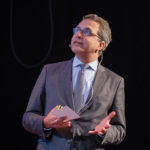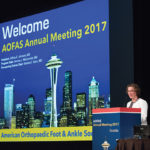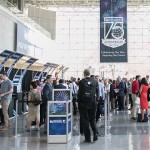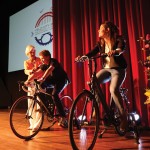Seven hundred scientists, resource professionals, federal employees, university staff, and students from all over the world addressed contemporary wildland-fire issues with 345 oral presentations, 17 plenary talks, 12 technical workshops, 13 planning meetings, and a poster session with 121 posters.
Challenges
AFE’s biggest concern going into this year’s congress was significant travel-budget cuts facing federal employees. (Read our Pre Con profile about AFE from September 2012.) And while the meeting saw a strong overall turnout, with 700 delegates, not everyone was so lucky. “Some people who had registered, and even some of our speakers,” said Timothy Ingalsbee, Ph.D., co-director of AFE, “had to cancel at the last minute, because they couldn’t get the funds they needed. … [T]hat was a little bit of a challenge, notifying registrants that certain individuals wouldn’t be able to give their talks.”
Larger crowds also meant a new set of problems for AFE. “For our events, this was a very complex one,” Ingalsbee said. “We had our guests split into three hotels. That involved coordinating multiple contractors, vendors, suppliers, and equipment.”
Initiatives
Increasing collaboration on a global level was the mission for this year’s congress — for which Ingalsbee thought Portland would be an ideal host, given the city’s focus on sustainability. “Our conference was a group of ecologists,” Ingalsbee said. “So [sustainability] was a major factor in our selection of Portland.” Going green was a message woven throughout the congress — including the locally sourced food provided by the convention center. “It was great. Everyone loved it,” Ingalsbee said. “It was nice to showcase the city, especially to our international guests, and the unique culture and cuisines of the Pacific Northwest.”
AFE included maps of Portland with its conference programs, highlighting fun and interesting places to go that would take attendees off the beaten path. “We mainly featured the neighborhoods,” Ingalsbee said. “Downtown, Chinatown, areas like that, that have great restaurants, bookstores, boutiques. Less museums and zoos and things like that.” Travel Portland even granted AFE attendees free access to the city’s light-rail system.
To foster collaboration and make more educational opportunities available to a wider array of delegates, for the first time AFE offered its hands-on workshops for free. “It enabled nontraditional folks to experience them — people who might not have gone because the sessions are very technical in nature,” Ingalsbee said. “A lot of workshops were filled to the brim.”
The event went so smoothly that Ingalsbee himself had more time to network with his colleagues. “Some of these people I see only once a year at these events, and it’s just great to get reconnected,” he said. “That’s what makes these kinds of events so essential. You don’t get that from a webinar, or a Skype session. You get that informal meet-and-greet and collaborative experience at these conferences.”
Despite losing a few attendees and speakers to budget cuts, Ingalsbee is hopeful for the congress’ future. “People network and hook up to collaborate, and that’s what’s needed these days,” he said. “With shrinking funds and resources, they’re having to work together more, and that’s a good thing.”.
Stats: International Fire Ecology and Management Congress
2009 Savannah, Ga.
- 400 Attendees
- 15 Exhibitors
2012 Portland
- 700 Attendees
- 21 Exhibitors
Convene’s Pre-Con/Post-Con series asks meeting planners about their challenges and how they intend to address them (Pre-Con), and then circles back around after the meeting has occurred (Post-Con) to see how well they worked out.



